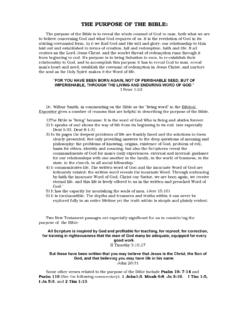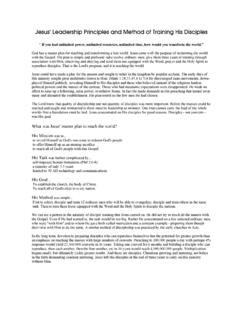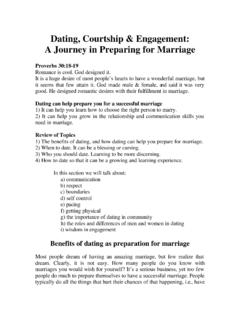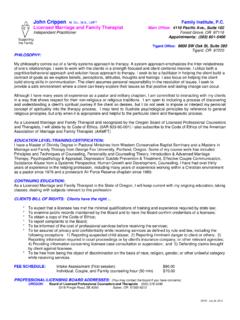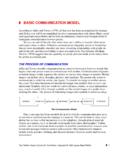Transcription of Marital Conflicts - Eldrbarry
1 MMaritalarital CConflictsonflicts:: Conflicts between married people are not necessarily destructive. Rightly used, they provide valuable clues that show us the growing edges of our relationship - the points at which we need to work together to make it richer and deeper. Conflict is very natural because we are unique and different individuals with different tastes, habits, likes and dislikes, values and standards. As we progress deeper into our relationships, it is inevitable that opinions, feelings and wants will clash. Conflict becomes destructive when our "weapons" are turned upon each other instead of on the problem or issue.
2 If we ignore or suppress these issues, it may just set the stage for a painful explosion of built up anger. Pride, selfishness, suspicions and confusion or matters left unresolved from our pasts all enter into conflict. There is always risk in confrontation and love, but sometimes it is necessary for a healthy growing relationship. Learn to recognize and improve your individual patterns of conflict. Differences Disagreement Conflict Resolution Avoidance of real issues THE FIVE STYLES OF CONFLICTTHE FIVE STYLES OF CONFLICT:: (High concern for relationship) YIELDYIELDRESORESOLVELVE(low in (high in achievedCOMPROMISECOMPROMISE achievedneeds)needs) WITHDRAW WITHDRAW WINWIN(Low concern for relationship) 1.
3 WithdrawalWithdrawal: may be physically or psychological. 2. WinningWinning: the goal no matter what the cost. 3. YieldingYielding: giving in, being the loser or martyr 4. CompromiseCompromise: give a little, get a little, bargaining 5. ResolveResolve: spending time through communication in resolving a conflict to a mutually agreeable solution. Of these, compromisecompromise and resolutionresolution accomplish the most for a relationship. The other three styles may fail to come to grip with the real issues and only postpone the conflict.
4 But in a relationship each style has its proper time and place. Why Making Up is so sweet!! There is a constructive side to Marital Conflicts . They open up doors to communication and increased intimacy, if that door is not kept closed, or slammed shut, or bolted and locked. They help us to get to know ourselves, and see and face ourselves as we are, teaching us humility and offering possibilities for confession and forgiveness. They help us to move to deeper levels revealing needs not being met, feelings needing healing, and they can help us develop ways to meet those needs and heal those hurt feelings.
5 Conflict used correctly can break down walls between us, get behind the symptoms to the real issues, and provide alternative solutions for solving problems. It also gives us opportunities to show and express and reinforce our concern, love, and care for each other and affirm our commitment to one another. Making up is so sweet because we have cleared the air of the relationship releasing all those built up tensions and the painful feelings that were keeping us apart. SOME IMPORTANT ASPECTS OF HANDLING CONFLICT ARE: Choose the right time and place, establish ground rules for "fair fighting" and never go to bed angry!
6 Putting off a conflict only makes it more emotional and increases the tension. Putting off minor matters now, may produce a major explosion later. Avoid times of exhaustion or physical distresses. Learn to listen: Give your spouse your complete attention, and patiently hear them out, then before answering them, restate what you have "heard" the other person saying (verbally and non-verbally) and give them opportunity to correct your "understanding" of what you heard them say. This is called active listening. It is important we state clearly what we mean, and avoid confusion of the issues.
7 Don't beat around the bush or play "games". Document descriptively by stating what you see happening in the conflict: name your feelings, use metaphors, similes and appropriate figures of speech, and express verbally what you feel like doing. Learn to "own" the problem Identify your contributions by recognizing that in every conflict part of the problem is yours - and you must accept and deal with that. Focus on why you are angry instead of your spouse's anger. Use "I" messages rather than "You" messages, stating what you feel, need or want rather than making accusations and pronouncing judgments that damage the other's self-esteem and the relationship.
8 Speak just for yourself - beware of "you" messages disguised as "I" or "we" messages. "I" messages put your own emotional "cards" on the table: "I feel (feeling) when (description of problem) because it (tangible effects on me)": For example: "I feel hurt when you forget to kiss me good-bye because it makes me feel unloved and taken for granted." Deal with Facts, then Feelings, and then Needs. Suggest appropriate responses you are willing to undertake, and ask for your partners opinions, observations and suggestions. Even when there are Conflicts , never withhold physical intimacy from your spouse, or try to use it to manipulate.
9 (I Cor 7:5) And respect your partner's vulnerability in such situations. Sometimes recurring Conflicts require a "pre-solution". When a pattern of repeated friction develops, and destructive tendencies are becoming apparent - a couple ought to analyze the causes (which may be due to differences in temperament or sources differing from the issues) outside of the heat of "battle" and affirm together a plan of action in advance for the next time around. There is also a post-solution: confession, forgiveness and reconciliation. Love is being able to say, I am wrong!
10 I am sorry! Please forgive me! And love can also chose to forgive making the deliberate decision to not raise the issue or matter again. We are commanded to forgive one another as Christ has forgiven us, and to be reconciled to one another. Conflict Escalations: : Differences of Opinion Spat Confrontation Heated Debate or Argument Quarrel Division Intense Anger Expressed Fight Rejection Hostility Confirmed War Separation The Don ts of Marital Warfare: 1.

